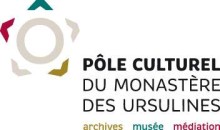Pôle culturel du Monastère des Ursulines

12, Donnacona St., Quebec City (Quebec) G1R 3Y7
418-694-0694
archives@ursulines-uc.com
polecultureldesursulines.ca
polecultureldesursulines
pole_culturel_des_ursulines
CONSULTATION
Tuesday to Thursday, from 9 am to 3:30 pm, by appointment only.
Researchers may fill out a request form online on the website or provide the purpose of their research over the telephone.
BRIEF HISTORY
The archive department of the Ursulines de Québec, officially created in 1972, has in reality existed since 1639, the year when the Ursulines arrived in New France with documents to mark their presence in the colony. According to their constitution, the documents fall under the protection of the custodial sister. The "custodial-archivist" sisters who succeeded her have taken great care of the religious community’s papers. The Ursulines’ archives also include documents that bear witness their commitment to education beyond Quebec City, in the many regions where they established themselves. From Roberval to Stanstead and from Jacquet River (New Brunswick) to Maillardville (British Columbia), passing through Gaspé, Amqui, Trois-Rivières, Shawinigan and Anticosti Island, each of the Ursulines’ monasteries has maintained its own archives department led by archivists eager to conserve the memory of their communities and of their mission of education. After more than 375 years under their responsability, the Ursulines of the Canadian Union in 2017 confided the care of their archival heritage to the Pôle culturel du Monastère des Ursulines, an non-profit organization.
DESCRIPTION OF FONDS AND COLLECTIONS
The fonds conserved at the archives of the Pôle culturel du Monastère des Ursulines cover a time span from 1609 to 2019 and a geographical span including regions in Quebec and Canada and also in Peru, Japan, and the Philippines. These collections contain written correspondence between civil and ecclesiastical authorities, members of secular society, and members of feminine and masculine religious orders in Quebec, the United States, Europe, and Asia. They also include all the records and documents created to sustain the operation, administration, financing and transmission of the history of the monasteries and their educational institutions (annals, lists of enrollment, accounting ledgers, etc.). Lastly, they bring together the inventories, records, and maps that allowed the Ursulines to manage the grounds and properties under their care. In addition to textual documents, the collections are also composed of iconographic, audio-visual, cartographic, and architectural documentation.
The archives of the Pôle culturel du Monastère des Ursulines also possess a numismatic collection, antique books, and several objects used for the administration of the monasteries and schools of the Ursulines or used by the nuns. These objects include seals, ink stamps, small devotional artefacts, pins, ribbons, teaching materials, recognition plaques, etc.
Time span covered by archives: 1609-today
Technical specifications and maps: approx. 823
Iconographic documents: approx. 184,050
Textual documents: approx. 463 m.l.
Hours of audio recordings: approx. 3,450
Hours of video recordings: approx. 687
Number of fonds: 32
Individual objects: approx. 2,800
MANDATE AND MISSION
The archives department has a mandate to receive, conserve and showcase the archival legacy of the Ursulines of the Canadian Union.